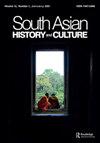The “Authentic Evocation” in Ethnographic Photography as Art: Taking Lau Pok Chi’s Art Practice as an Example
IF 0.3
0 ASIAN STUDIES
引用次数: 0
Abstract
This article emphasizes the disciplinary problems of anthropology after the representation crisis, and the connected phenomenon of the intersection of the disciplines of art and anthropology, considering the art practice of the Chinese American photographer Lau Pok Chi, mainly his Cuban Chinese project, as an instance for showcasing the authenticity of photographic art as ethnographic practice and its value for the development of anthropology. After assessing the important motivation of the artist’s practice, which is rooted in his construction of self-identity, and the methods and principles of his “quasi-ethnographic” research, this paper recommends that the authenticity of such type of ethnographic photography also obtains from its exposure of reflexivity and the transcendence of the separation of “things” and “words”, which may further motivate the multiple explorations of the two-way intervention between these two disciplines.本文以美籍华人摄影师刘伯志的艺术实践,主要是他的古巴华人项目为例,强调再现危机后人类学的学科问题,以及艺术与人类学学科交叉的关联现象,以展示摄影艺术作为民族志实践的真实性及其对人类学发展的价值。本文在评估艺术家实践的重要动机,其根源在于自我认同的建构,以及其“准民族志”研究的方法和原则之后,认为这种类型的民族志摄影的真实性也来自于其对反身性的暴露和对“物”与“词”分离的超越,这可能进一步激发这两个学科之间双向介入的多重探索。
本文章由计算机程序翻译,如有差异,请以英文原文为准。
求助全文
约1分钟内获得全文
求助全文

 求助内容:
求助内容: 应助结果提醒方式:
应助结果提醒方式:


